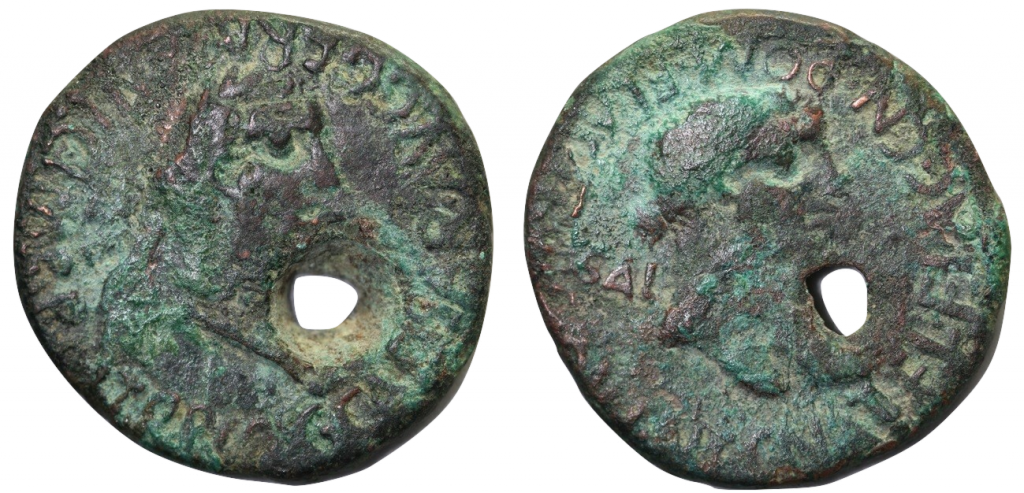January 24, 2016, by Will Leveritt
On this day in AD 41, the Roman emperor Caligula was murdered in Rome.
Text by Annabel Rock-Clarke
Image by Sarah Jordan
Gaius Julius Caesar Augustus Germanicus, popularly known as Caligula, succeeded Tiberius as emperor and reigned for 3 years and 10 months. What we know of Caligula’s colourful character is down to the survival of works by ancient writers such as Suetonius, Cassius Dio, Seneca, and Philo of Alexandria. Unfortunately, Tacitus’ account of Caligula’s reign has been lost.

AE as of Caligula. Obverse has laureate head of the emperor r., C CAESAR AVG GERMANIC IMP P M TR P COS. Reverse has female head r. (variously identified), CN ATEL FLAC CN POM FLAC II VIR Q V I N C / SAL AVG. Small hole through the coin. 28.5mm, 13.48g, 4 o’clock.
His father was Germanicus, a member of the ruling Julio-Claudian dynasty, the nephew and eventual adopted son of Tiberius, and one of the regime’s most popular and successful generals. As a boy he accompanied his father on his military campaigns, and his nickname ‘Caligula’ (meaning ‘little boot’) was given to him by the troops because his parents would dress him in a miniature soldier’s uniform, including the military boots (caligae).
His mother was Agrippina the Elder, the granddaughter of Augustus. She became heavily involved in politics at Tiberius’ court and agitated for her sons to succeed Tiberius. Her relationship with Tiberius was strained and he grew suspicious of her; this situation came to a head with the arrest of Agrippina and her two other sons, Drusus and Nero. She was exiled to the island of Pandateria where she is said to have starved herself to death. Her sons also died, leaving Caligula the sole survivor of her family.
Indeed, in AD 31 Tiberius sent for Caligula and he moved to the island of Capri, to which Tiberius had permanently retired in AD 26. Far from having the young man murdered (which many seem to have expected) he was allowed not only to live, but was made an honorary quaestor in AD 33 and two years later was made the co-inheritor of Tiberius’ estate (alongside Tiberius’ grandson Tiberius Gemellus). After Tiberius died Caligula had his will nullified in part, so that he inherited the entire estate. Not long into his reign, Caligula had Gemellus killed.
Initially, Caligula was hugely popular as emperor, due to the love the people had for his father and also because he appeared to be the complete opposite of his old, dour, and sullen predecessor. Caligula provided lavish games for the Roman people, gave the troops pay bonuses, abolished some taxes, ended the treason trials that had plagued the reign of his predecessor, and even attempted to restore a degree of genuine power to the popular assemblies (though ultimately without success).
However, there is another side to Caligula exposed in the writings of our sources. The picture they paint is of a cruel, vicious emperor who ordered the murders of many people, both supporters and perceived opponents alike, and overindulged in luxurious living and sex (including, according to our more salacious sources, with his own sisters).
He also began to demand he be treated and worshipped as a living god, in the manner of the Hellenistic monarchs of the Greek east. By AD 39 his relations with the senate had badly deteriorated in large part due to the trials, murders, and the various small humiliations he enjoyed inflicting on its members (such as forcing them to run alongside his carriage if they wished to speak to him). This led to a number of failed conspiracies being mounted against him.
The successful conspiracy took place on 24 January AD 41 in the cryptoporticus (underground corridor) beneath the imperial palace on the Palatine Hill. A member of Praetorian Guard, Cassius Chaerea, and two other soldiers, stabbed the Emperor to death. Other family members living in the palace, including Caligula’s wife, Caesonia, and their baby daughter, Julia Drusilla, were sought out and brutally killed.
Suetonius records that Caligula’s death resembled that of Julius Caesar, with certain details ringing true for both murders: the names of both victims were Gaius Julius Caesar, they were both allegedly stabbed 30 times, and both leaders of the conspiracies against them were named Cassius (Cassius Longinus and Cassius Chaerea).
The senate considered using Caligula’s death as an opportunity to restore the republic but the military still remained loyal to the idea of a monarchy. The Roman people demanded that Caligula’s assassins be brought to justice. Their wishes were granted when Claudius became emperor and ordered the execution of Chaerea and the other conspirators.
No comments yet, fill out a comment to be the first

Leave a Reply